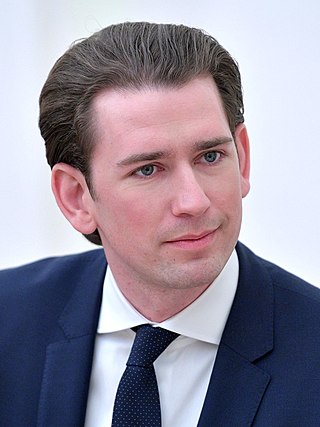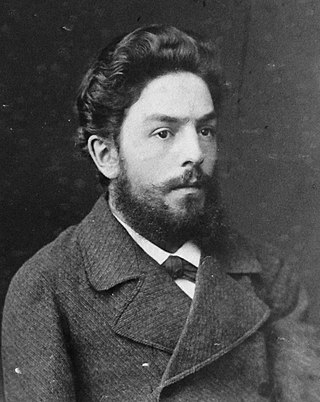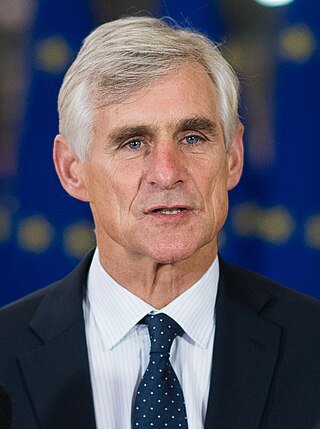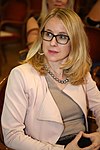
The chancellor of the Republic of Austria is the head of government of the Republic of Austria. The position corresponds to that of Prime Minister in several other parliamentary democracies.

Politics in Austria reflects the dynamics of competition among multiple political parties, which led to the formation of a Conservative-Green coalition government for the first time in January 2020, following the snap elections of 29 September 2019, and the election of a former Green Party leader to the presidency in 2016.

Alexander "Sascha" Van der Bellen, also referred to by the abbreviation VDB, is the current president of Austria. He previously served as a professor of economics at the University of Vienna, and after joining politics, as the spokesman of the Austrian Green Party.

NEOS – The New Austria and Liberal Forum is a liberal political party in Austria. It was founded as NEOS – The New Austria in 2012. In 2014, NEOS merged with Liberal Forum and adopted its current name.

Sebastian Kurz is an Austrian former politician who served twice as the chancellor of Austria, initially from December 2017 to May 2019 and then a second time from January 2020 to October 2021. On 23 February 2024, Kurz received an eight-month suspended sentence after being convicted of perjury by a court in Vienna over his involvement in a parliamentary inquiry.

Presidential elections were held in Austria on 24 April 2016, with a second round run-off on 22 May 2016. However, the results of the second round were annulled and a re-vote took place on 4 December 2016.

Norbert Gerwald Hofer is an Austrian politician who served as Leader of the Freedom Party of Austria (FPÖ) from June 2019 to June 2021. He previously was Minister for Transport, Innovation and Technology from 2017 to 2019 under Chancellor Sebastian Kurz.

Aleksander Konstantin von der Bellen, later known as Alexander van der Bellen, and called Sascha by family and friends, was a Russian liberal politician and nobleman.

Legislative elections were held in Austria on 29 September 2019 to elect the 27th National Council, the lower house of Austria's bicameral parliament. The snap election was called in the wake of the Ibiza affair in May, which caused the resignation of Vice Chancellor Heinz-Christian Strache and the collapse of the governing coalition of the Austrian People's Party (ÖVP) and Freedom Party of Austria (FPÖ). The government subsequently lost a motion of no confidence in parliament, before ÖVP Chancellor Sebastian Kurz was replaced by non-partisan Brigitte Bierlein on an interim basis.

The First Kurz government was the 30th Government of Austria in office from 18 December 2017 until 3 June 2019. It succeeded the Kern government formed after the 2017 legislative election. Sebastian Kurz, chairman of the centre-right Austrian People's Party, known by its initials in German as ÖVP, reached an agreement on a coalition with the far-right Freedom Party of Austria (FPÖ), setting the stage for Kurz to become chancellor of Austria—the youngest head of government in Europe—for the first time.

The Bierlein government was the 32nd Government of Austria following the collapse of the First Kurz government headed by Chancellor Sebastian Kurz in the aftermath of the Ibiza affair. Sworn in on 3 June 2019, the Bierlein government was the first purely technocratic government in Austrian history, first interim government after a successful motion of no confidence in Parliament and first government headed by a female chancellor. As head of government, Brigitte Bierlein was assisted by Clemens Jabloner as vice-chancellor.

Alexander Georg Nicolas Schallenberg OMRI is an Austrian diplomat, jurist, and politician who has served as Minister for Foreign Affairs in the government of Chancellor Karl Nehammer since 2021, previously holding the office from 2019 to 2021. A member of the Austrian People's Party (ÖVP), he held the position in the second government of Sebastian Kurz, before briefly serving as Chancellor of Austria as Kurz's successor from 11 October to 6 December 2021.

The Second Kurz government was the 33rd Government of Austria. Led by Sebastian Kurz as chancellor and Werner Kogler as vice-chancellor, it was sworn in by President Alexander Van der Bellen on 7 January 2020. It was officially dissolved and succeeded by the Schallenberg government on 11 October 2021.

Karl Nehammer is an Austrian politician who is the 32nd and current chancellor of Austria since 6 December 2021. A member of the Austrian People's Party (ÖVP), he previously was Minister of the Interior from 2020 to 2021, general secretary of the ÖVP from 2018 to 2020, as well as a member of the National Council from 2017 to 2020. Nehammer assumed the chancellorship as the successor of Alexander Schallenberg, who resigned to return as Minister of Foreign Affairs.

Alma Zadić is a Bosnian-born Austrian lawyer and politician of the Green Party. She has been serving as Minister of Justice since 7 January 2020 in the governments of Chancellors Sebastian Kurz, Alexander Schallenberg and Karl Nehammer.
Legislative elections will be held in Austria on 29 September 2024 to elect the 28th National Council, the lower house of Austria's bicameral parliament.
Events in the year 2021 in Austria.

Austria-China relations, also known as Austro-Chinese or Sino-Austrian relations, are the bilateral relations between Austria and China. Austria holds an embassy in Beijing, and China holds an embassy in Vienna. There are also two Confucius Institutes in Austria in Vienna and Graz.

Presidential elections were held in Austria on 9 October 2022. Incumbent Alexander Van der Bellen from the Greens was eligible for one more term and ran for re-election. About 6.36 million voting-age citizens were eligible to vote.

Michael Linhart is an Austrian diplomat and politician who was appointed as the new Austrian Ambassador at Berlin on 15 December 2021. Before that, he served as minister of foreign affairs of the Republic of Austria in the Schallenberg government from 11 October to 6 December 2021, ambassador of the Republic of Austria to France from 2018 to 2021 and Secretary-General at the Federal Ministry for Europe, Integration and Foreign Affairs from 2013 to 2018.

































